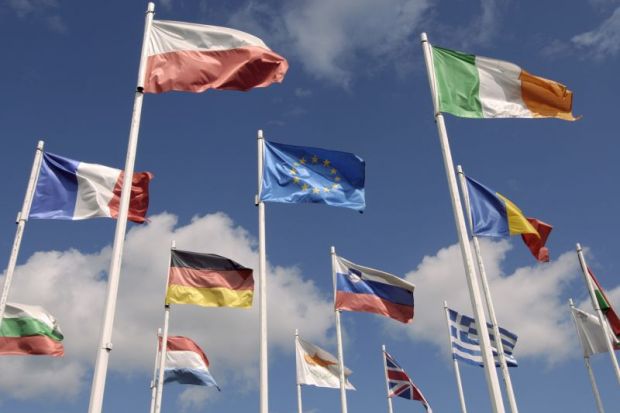On Saturday, European Commission president Ursula von der Leyen injected a new sense of urgency into the European Union’s discussions about the next Multiannual Financial Framework (MFF), which is due to begin in January.
After months of infighting between member states about the original commission proposal, von der Leyen announced that the commission will make a new MFF proposal as an appropriate response to the coronavirus crisis. This has important implications for Horizon Europe.
Von der Leyen focused her announcement on the EU’s cohesion funds, which she argued needed strengthening to ensure that Europe as a whole would bounce back from the crisis. Coupled with a potentially greater reluctance among cash-strapped member states to spend money on the EU, this might have the effect of endangering the budget currently proposed for the EU’s research framework programme, Horizon Europe.
Of course, this new commission initiative does not mean that an agreement on the MFF is within reach. Governments are spending all their energy fighting Covid-19, leaving little room to deal with the complexities of the MFF. Moreover, the financial uncertainties caused by the pandemic are likely to make governments reluctant to commit for the next seven-year period. We may yet see the prolongation of Horizon 2020 by an extra year, with the commission doing everything that is legally possible to prepare for a smooth transition to Horizon Europe.
Over the past few weeks, the EU has responded very quickly to the coronavirus crisis with the resources currently at its disposal. It has already mobilised €47.5 million (£43 million) of Horizon 2020 funds and an additional €45 million via the Innovative Medicines Initiative, which is also funded through Horizon 2020. €80 million has been provided to the German pharma company CureVac to accelerate the development of a vaccine. And the European Innovation Council (EIC)’s Accelerator call, which closed on 20 March, saw more than 1,000 proposals on Covid-19 from start-ups and SMEs, opening up the possibility of further adjustments to the EIC Work Programme 2020 to support the response to the outbreak.
The commission is clearly working hard to demonstrate that in its unique ability to enable cross-border research and bring together the best minds worldwide, it can provide outstanding value to member states. But soon politicians will look for any excuse to cut public expenditure. After the 2008 financial crisis, expenditure on research and innovation in Europe contracted. But Covid-19 is not the only challenge that affects us all, across continents. EU member states are connected not just through the single market, but through the global challenges that they must face together. Covid-19 is only the most urgent of them right now. Others will follow.
The coronavirus pandemic does not just affect the next budget for Horizon Europe. It is also a salutary reminder of the importance of excellence as the basis of science. Under pressure from populism, there is a temptation for policymakers to dilute the definition of scientific excellence to include other priorities, such as citizen science. But the problem is not that citizens distrust science: three-quarters of the public worldwide trust scientists, according to the Wellcome Global Monitor, a figure politicians would give their eye teeth for.
We know excellence when we see it. In the case of the coronavirus, anything that helps us understand its nature, spread and behaviour is critical. Of course citizens should be involved in the research where appropriate, but never as a goal in itself. Ultimately, people will support spending on research and innovation if it is effective and benefits their lives.
Crucially, the current threat to public health underlines why we need fundamental science as much as applied research. As Bruno Canard, director of research at France’s National Centre for Scientific Research, has argued, we would not have to look this hard for a Covid-19 vaccine had Europe invested more in fundamental research: specifically, if funding for research into the Sars virus had not been frozen three years after its outbreak in 2003 as political priorities changed.
To be sure, political choices always have to be made about how public money is spent. But excellent cross-border science, both pure and applied, is not a luxury. This is why UK researchers must continue to work seamlessly together, through full UK association to Horizon Europe.
Given the scientific and societal challenges we face, we know that a budget of €94 billion for Horizon Europe is not enough. Universities have long urged that we need €120 billion in the next MFF. It is for the politicians demanding that science deal with the coronavirus to tell us why that is too much to invest in saving lives and making our societies and economies prosper.
Jan Palmowski is secretary general of the Guild of European Research-intensive Universities and a professor of modern history at the University of Warwick.
Register to continue
Why register?
- Registration is free and only takes a moment
- Once registered, you can read 3 articles a month
- Sign up for our newsletter
Subscribe
Or subscribe for unlimited access to:
- Unlimited access to news, views, insights & reviews
- Digital editions
- Digital access to THE’s university and college rankings analysis
Already registered or a current subscriber?








